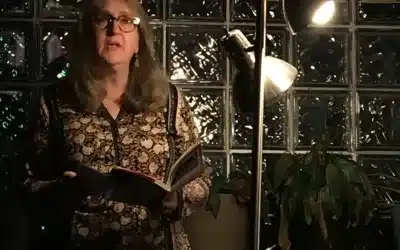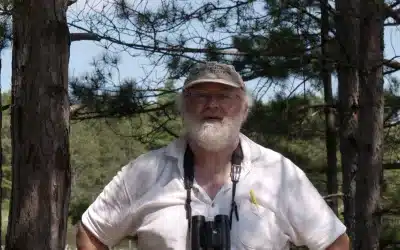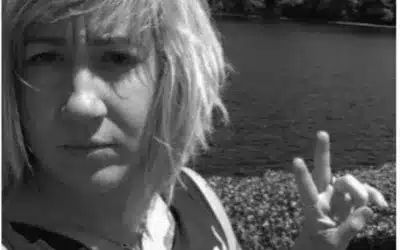D. Nurkse is the author of twelve collections of poetry, most recently A Country of Strangers (2022) from Alfred Knopf. Hanging Loose published Nurkse’s first collection of poems, Shadow Wars, in 1988. He’s the recipient of a Literature Award from the American Academy of Arts and Letters, a Guggenheim fellowship in poetry, two National Endowment for the Arts fellowships, two New York Foundation for the Arts fellowships, the Whiting Writers Award, and prizes from The Poetry Foundation and the Tanne Foundation. He served as poet laureate of Brooklyn from 1996 to 2001. His work has been translated into French, Russian, Italian, Estonian, and other languages. Nurkse has also written on human rights and was elected to the board of Amnesty International-USA for a 2007-2010 term. Nurkse has taught poetry at Rikers Island Correctional Facility and in inner-city literacy programs, as well as at MFA programs at Rutgers, Brooklyn College, and Stonecoast. For the Brooklyn Public Library, he edited This Beautiful Name Is Mine, poems by inner-city children. He’s currently a long-term member of the writing faculty at Sarah Lawrence College. He lives in Brooklyn with his wife the writer Beth Bosworth, and the wild puppy Zephyr.

Hanging Loose Press: What are this past year’s accomplishments that you are most proud of?
D.Nurkse: Since you ask I’m proud of A Country of Strangers, a new and selected, my most recent book.
HLP: Congratulations. It looks wonderful. Can you describe a little bit about your process for writing this book?
DN: I felt crazy lucky to do this book. People don’t usually ask me to do books—this one was my editor’s idea.
Some people don’t like to go back to their early work, but there was huge triage, very little of what I wrote or published in mags found its way into my books, so choosing work for inclusion, rather than exclusion, was blissful. The new poems are often a response to our times—like a knee jerking to a mallet. I hope they hold up.
I’m also very proud of the young poets who are dealing with creeping and not-so-creeping fascism, climate change, and debt, and keeping their faith in the art.
HLP: Are you thinking of any young poets in particular? How do you think they are managing to keep their heads above water despite all of this turmoil?
DN: I think of poets I worked with—not necessarily young, but younger than me–dg nanouk okpik, Rose Berger, Quincy Scott Jones. Quincy wrote about police violence and, having made a statement, established connections, had to stand back and watch the killings continue. dg is Inuit and has to watch the climate collapse ten times faster in the North where her family is from. Rose’s book-so few reviews. I think they find ways to take a longer view. They inspire me. If I were connected to America just by the twenty-four hour news cycle, I wouldn’t last a minute.

HLP: Any particularly difficult experiences/challenges for you recently? And how did you work through them?
DN: This last year was tough for a trifecta of RSV, Covid, and flu, and the knowledge that our public health system remains fragile. I feel I’m past that, but just thanks to the Change. I’m not good at resilience.
I’m trying to keep the internet from nibbling a hole in my psyche. To have our dream life and our language and our presence in the world and our friendships all sponsored by corporations is untenable. Our culture is becoming all loneliness, no solitude. Even by myself, I keep expecting a message—to me or from me. I haven’t found a way to resist but I will. Writing this for cyberspace, trying to be sincere, my tone still feels a tad like the generic intimacy that mass media fosters and poetry shatters.
HLP: Nothing defines as deeply or intrinsically as our dream life, but do you think even that is being infiltrated?
DN: I’m surrounded by people watching Netflix at 4AM: that is their dream life. Also, unfortunately, by conspiracy people to whom everything in culture and politics has the plausibility and intimacy of a dream. I think a lot about anonymous obligatory public intimacy, intimacy based on category, without mutuality, agon or exchange: it feels pornographic. So much of this comes down to decisions the handful of people who own social media make. We’re being ruled by images stolen from our subconscious, warmed up, and fed back to us.
HLP: Well, at least we still have books! What are three books you’ve read recently that have made an impression on you?
DN: Recent reading: a revisit of Toni Morrison’s Beloved. It’s writing for all time, the familiarity and strangeness of genius. As for new poetry: Mervyn Taylor’s The Last Train has the tense arc of a human life and takes you to places—Jamaica, Trinidad—that recognize poetry but aren’t always recognized in it. Jennifer Franklin’s riveting If Some God Shakes Your House channels Antigone for 2023, but stays true to the hard questions the play confronted in 441 B.C.E.
It’s an exhausting but beautiful time for poetry in America. As I grow older, poetry feels more and more important. Yes, it changes nothing, but maybe it gives us an inkling of who we are. We’ve learned almost nothing about ourselves in twenty-five centuries. The birds in the trees know everything about us.
HLP: I love your explicative line about this being an “exhausting but beautiful time for poetry now”.
DN: I do feel it’s a very beautiful time. I feel that taken-for-granted authority of the narrator is eroding, voices are coming at you from all sides, and it’s up to you to decide which are real and which are the voices of ghosts.

The White Prisons
The kids ask: do you also teach in the white prisons?
There are white schools, white libraries, white hospitals, churches, parks and ball fields, why
wouldn’t there be white prisons?
Blue snow pulses in a tiny gated window: an idea at once vague and obsessive.
The kids have been writing their poem. It starts with the blank page, a doodle in the margin, but
soon you are a child in the streets. Oily slush seeps up through the soles of your Nikes. You pass
a Burger King, Zion Redeemer, the ironworks under sleet. Pitkin Avenue does not go all the way
to morning. The white Lexus appears out of nowhere. Where to run: icy stoops, steel-shod doors.
I expect to live another three years. Maybe two and six weeks. Six weeks and seven days.
Probably to my nineteenth birthday.
It happens every night in my mind: the long street, the hour before dawn, the white Lexus, my
enemy’s face in the tinted window. So familiar. So masked.
from A Country of Strangers
Order your copy from https://bit.ly/dennisnurkse





